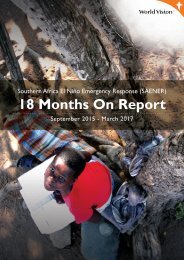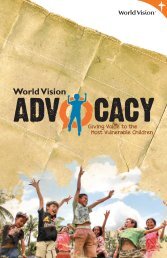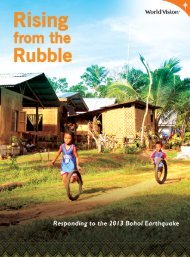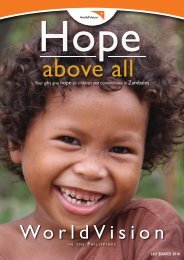INTER-AGENCY LIVELIHOOD ASSESSMENT - ARUA DISTRICT NORTHERN UGANDA GOAL
You also want an ePaper? Increase the reach of your titles
YUMPU automatically turns print PDFs into web optimized ePapers that Google loves.
community households respectively have at least five to six adults who are not currently working.<br />
Meanwhile, in the host communities, 1% reported having nine adults or more who are not currently<br />
working.<br />
Marital Status<br />
The majority of both the refugees and the host communities surveyed were married, reflecting 70%<br />
and 83% respectively though there are also many cases where spouses involuntarily live apart due<br />
to conflict or where some reported that their husbands had returned to South Sudan to rescue and<br />
guard property they left behind.<br />
100%<br />
80%<br />
60%<br />
40%<br />
70%<br />
Figure 4: Household Heads by Marital Status<br />
83%<br />
20%<br />
0<br />
9%9 10% % 2%<br />
Refugees<br />
5% 5% 6% 1%<br />
Host Community<br />
Single Married Separated Widowed Widower<br />
Marital separation was twice as likely among refugees than the host communities and, as explained<br />
by the different respondents, the primary reason for separation, particularly among the refugees,<br />
was due to the South Sudan conflict. Many separated refugees did not know where their spouse was<br />
whether dead or alive. At least 9% of the refugee respondents recounted separation of a spouse due<br />
to the confusion that forced them to flee their country. Marital separation was not prevalent among<br />
the host communities, as 6% of the respondents were single.<br />
Literacy<br />
The majority of the respondents in the refugee and host communities attained primary (44% and<br />
55% respectively) and secondary level (25%) of education. A smaller percentage, 14% from the host<br />
communities transitioned to tertiary level education while 3% from the refugee attended tertiary<br />
education - a limiting factor to accessing formal employment opportunities in Uganda. The level<br />
of education can predispose households to food insecurity and dependence on negative coping<br />
strategies to survive.<br />
Around 25% of refugee households surveyed did not have any formal education compared to 6% of<br />
the host communities. Most of the youth interviewed requested vocational training opportunities<br />
to equip them with the necessary skills to take advantage of available employment as well as engage<br />
actively in the local and international market economy.<br />
12<br />
<strong>INTER</strong>-<strong>AGENCY</strong> <strong>LIVELIHOOD</strong> <strong>ASSESSMENT</strong> TARGETING REFUGEES AND<br />
HOST COMMUNITIES IN MVEPI AND RHINO CAMP SETTLEMNTS










